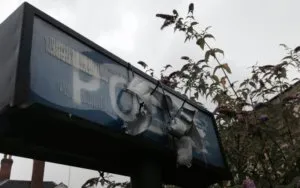More than one in seven people have witnessed a disability hate crime or incident in the last year, according to a new survey released to mark Holocaust Memorial Day.
Disabled campaigners say the figures, published by the Holocaust Memorial Day Trust, should push the criminal justice system to do more to recognise and act on the problem.
According to the survey, 15 per cent of people have witnessed at least one disability-related hate crime or hate incident in the last year, while more than two-thirds of those who witnessed a hate crime or incident regretted not challenging it.
And more than one-third of those who witnessed a disability-related hate crime or incident saw at least four such instances, while nearly one in 20 witnessed at least 10.
Anne Novis, an independent advisor on disability hate crime to the Metropolitan police, a trustee of Inclusion London and a coordinator of the Disability Hate Crime Network, said the figures were not a surprise.
She said disabled people were “well aware” of how much hostility they experience and how it has increased, while police spending cuts had led to reductions in action to prevent hostility, raise awareness and respond to reports.
She added: “Training is not sufficient, and inconsistency of approaches to disability hate crime mean it’s a postcode lottery whether police will respond as they should.
“The majority of disabled people will not report their experiences as it has become part of everyday life and they know little, if anything, will be done in response.
“Raising awareness about hate crime is important for everybody so all can understand they can make a difference by reporting the incident, coming forward as a witness, and assisting the victim in such situations.”
Novis said that disabled people “do not have equality of law when we experience hostility”, while most police officers only recognise it as anti-social behaviour rather than “the very real experience and impact of disability hate crime”.
She added: “Hopefully, this will be yet another reminder to all to do much more on this issue, and that all members of society can make a difference if they act rather than being passive.”
Stephen Brookes (pictured), another coordinator of the Disability Hate Crime Network and an ambassador for Disability Rights UK, also said the figures were not a surprise and underlined the need for far more realistic statistics on disability hate crime.
He said he was particularly disappointed by the number of people who witnessed hate crimes and incidents but refused to take action.
He said: “It’s easy to blame police and the Crown Prosecution Service for failures, but when we don’t take action, how can they?”
He said it was vital to keep pressing the trust’s message that “silence and indifference in the face of discrimination and hatred allows persecution to take root”, which he said was demonstrated by the successful third-party reporting centres run by disabled people’s user-led organisations, where “disabled people talk to and report incidents to disabled people”.
Brookes said: “This is a message the Disability Hate Crime Network not just endorses but insists is imperative in the fight against disability hate crime.
“We would add the words of our own logo: ‘Silence is acceptance so we must speak loudly.’”
The theme for yesterday’s (27 January) Holocaust Memorial Day – which was funded by the Department for Communities and Local Government – was “Don’t Stand By”.
Olivia Marks-Woldman, the trust’s chief executive, said: “Today is about remembering the atrocities of the Holocaust and subsequent genocides, but it’s also about finding ways to make sure they can never happen again.
“We know that silence and indifference in the face of discrimination and hatred allows persecution to take root, so we want to encourage people to stand up and speak out, in the way many brave souls have in the past.”
Holocaust Memorial Day is an annual commemoration for the millions of people murdered in the Holocaust, under Nazi persecution, and in subsequent genocides in Cambodia, Rwanda, Bosnia and Darfur.

 Met took formal action on just nine disability hate crimes in 2023, hustings is told
Met took formal action on just nine disability hate crimes in 2023, hustings is told Ruth Bashall: Tributes and affection for ‘mighty’ and ‘formidable’ activist
Ruth Bashall: Tributes and affection for ‘mighty’ and ‘formidable’ activist ‘Shocking’ disability hate crime figures, a year on from police and CPS promises
‘Shocking’ disability hate crime figures, a year on from police and CPS promises